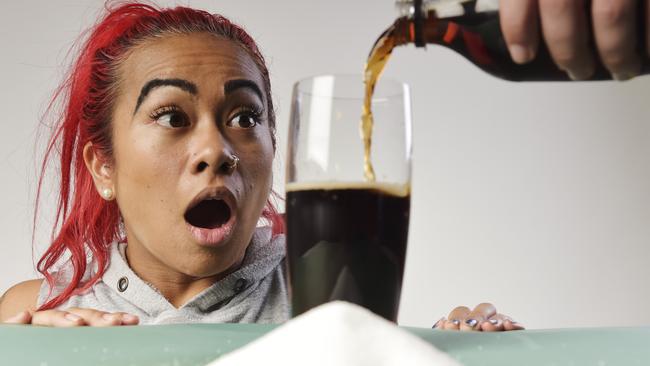Brain training could help overpower sugar addiction: researchers
Sugar changes the brain in the same way that alcohol and smoking addiction does — and training the mind could be the solution to the obesity problem, researchers say.

VIC News
Don't miss out on the headlines from VIC News. Followed categories will be added to My News.
Sugar changes the brain in the same way that alcohol and smoking addiction does, while scientists have also mapped the way our brains crave salt.
The findings come as researchers trial a mobile phone app that uses brain training to regain control of the circuits in the brain that are hijacked on unhealthy diets.
NOTHING SWEET ABOUT SUGAR SUBSTITUTES
SUGAR TAX, FAST-FOOD AD BAN TO BE REJECTED
The Queensland University of Technology laboratory of Associate Professor Selena Bartlett found the quit-smoking drug, Champix, could be used to treat sugar addiction in animals.
They found in the long term, both sugar and nicotine worked on the same receptors in the brain, acting on the same reward and pleasure centre of the brain.
And just like drug addicts need larger “hits” over time to get the same reward, they found the same was true for sugar consumption.
Prof Bartlett has now used those findings to design a brain training program, which works by first educating adults about poor food choices and then training them to overpower the stress-eating response.
They will measure the change in waist circumference after three weeks.
Just as GPs now write prescriptions for exercise to treat many physical and psychological illness, Prof Bartlett said she believed brain training would soon be a mainstay of obesity treatment.
“We have control over it. This is the bit that is missing in the conversations — the brain part of it,” she said.
“Everyone talks about exercise and dieting and mindful and yoga.

HOW HIDDEN SUGAR IS ADDING TO OUR HIPS
“But nobody is talking about the fact people can access control to retrain the brain and rewire it.”
Meanwhile, the University of Iowa’s Dr Joel Geerling also this week presented research at the Australasian Neuroscience Society’s annual scientific meeting in Brisbane that uncovered the brain cells which drive our appetite for salt.
“If you are of the opinion we are eating too much sodium, then it’s critically important to work out how to eat less,” Dr Geerling said. “Everything we have been trying to do medically, as a society or by governments to get people to eat less sodium has failed miserably.
“If there was a pharmacological way to help people stick to it, understanding the biology of the circuit — and what it has in common with other types of appetite such as addiction and hunger — would be important.”


